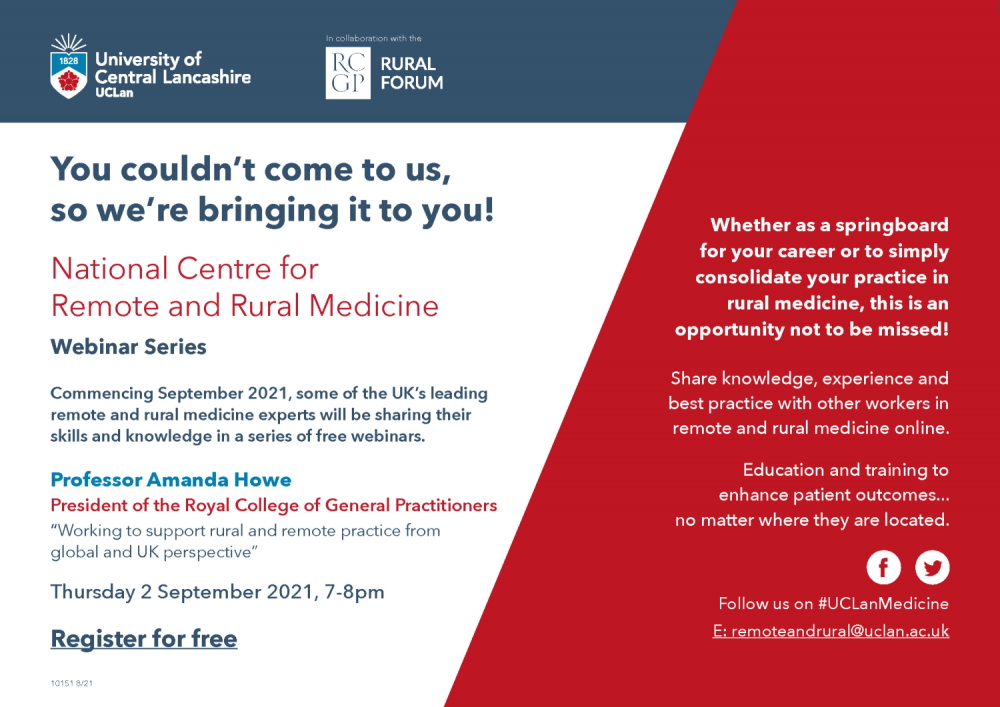T: 01822 851370 E: [email protected]
Visit RSN Survey about life in rural England to find out more.
August Edition of Casebook from the Rural Health and Care Alliance
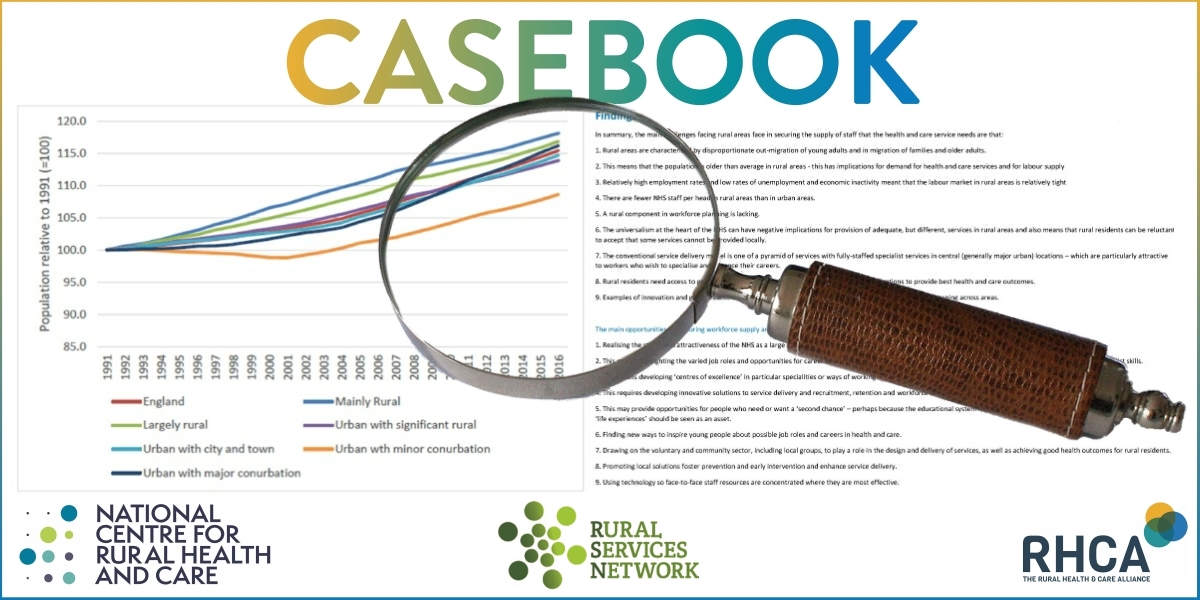
August 2021 Edition
This month – ruminations on the backwash in relation to the health and care system as we begin to think about how we manage the opening-up process and its effect on rural settings. Problems created by distance from services for deep rural settings and much of interest about upcoming and insightful activities planned by the Centre in National Centre for Rural Health and Care Update. Read on!
NEWS COMMENTARY
Oxford-jab chief criticises UK's Covid booster plan
I’d love to know what this story means for rural areas where our disproportionately high cohort of older residents is in rural settings. This story tells us:
Health Secretary Sajid Javid says he has already put plans in place to give the most vulnerable groups a third or booster Covid jab early next month.
But the head of the Oxford Vaccine Group said doses needed to "go where they can have the greatest impact" - to protect unvaccinated people abroad.
The UK itself currently had no reason to panic, Prof Sir Andrew Pollard said.
Mr Javid said he would wait for final advice from the Joint Committee on Vaccination and Immunisation (JCVI).
"My plan is to offer the flu vaccine, especially to over-50s, at the same time," he said.
A bigger flu season than normal is expected, with scientists warning respiratory viruses will make a comeback this year after disappearing last year during lockdown.
NHS bosses had previously said they needed lots of warning of a Covid booster programme in order to plan the logistics of vaccinating millions of people against both viruses.
Full article: https://www.bbc.co.uk/news/health-58159573
NHS England delays could lead to thousands of deaths, says heart charity
This is the first of two stories about the corrosive backlog built up through coronavirus and its implications for amongst other places, rural communities. It tells us:
Thousands of people with heart problems could die over the next few years due to increasingly long delays in NHS care, ministers have been warned.
The British Heart Foundation (BHF) fears that those needing treatment for heart attacks and stroke, diagnostic tests and potentially life-saving surgery could lose their lives while they wait.
The first year of Covid-19 brought 5,800 “excess” deaths from heart and circulatory conditions after many NHS services were suspended as hospitals focused on the pandemic. The BHF voiced alarm on Monday that long waits to receive hospital care could see that death toll rise even higher.
“Without immediate intervention there is a risk that thousands more people could die from heart and circulatory diseases, despite the NHS going above and beyond during the pandemic,” the BHS said.
Its findings come a day after the Institute for Fiscal Studies forecast that the number of people on the waiting list for all types of hospital treatment in England could top 15 million by 2025 – almost three times the current total of 5.3 million.
A new report from the BHF, The Untold Heartbreak, documents the impact on the health of patients with heart conditions of procedures being cancelled and appointments getting scrapped.
Full article: https://www.theguardian.com/society/2021/aug/09/nhs-england-delays-could-lead-to-thousands-of-deaths-says-heart-charity
NHS waiting lists could rise to 14 million in England next year – report
This is the second of a brace of stories about the impact of longer waiting times and bigger waiting lists, which will undoubtedly impact more severely on rural areas due to the major pockets of co-morbidities
Up to 14 million people could be on NHS waiting lists in England by next autumn, new analysis suggests.
Currently, some five million are waiting for routine operations and procedures - many of whom are in pain.
But the Institute for Fiscal Studies has warned there is a huge hidden backlog of patients who are still yet to come forward for treatment.
The government pointed to the £1bn it had given to the NHS this year to clear the backlog.
There have been repeated warnings over the length of hospital waiting lists in England. A record number of patients are currently waiting for surgery - such as hip or knee replacements - with more than 385,000 patients waiting more than a year, compared to just 1,600 before the pandemic.
Full article: https://www.bbc.co.uk/news/health-58132538
Three hours wait for an ambulance? Cumbrian town fights to keep its service
I have come across some excellent first responder schemes and I’m not sure it’s appropriate to class it as some might in the view of this article as a second-class alternative to standard state provision. I do appreciate however that the loss of this service in such a deep rural setting will be very challenging for the residents affected.
Living in one of the remotest communities in England, the residents of Alston Moor in Cumbria count themselves lucky to be surrounded by the breath-taking peaks of the Pennines.
But living somewhere so beautiful comes with downsides – there are just a couple of pubs, it is many miles to the nearest supermarket and a takeaway delivery is out of the question.
And now the community of 2,500 people is at risk of losing what it believes is vital to its health and survival – its local ambulance service. Alston Moor currently has four emergency medical technicians (EMTs) who live locally and operate an ambulance serving the 80-square-mile area..
But if North West Ambulance Service (NWAS) proposals go ahead, the EMTs will be replaced by a community first responder – a trained member of the public rather than a professional – who can reach an emergency quickly to help patients until an ambulance arrives from elsewhere in the county.
More than 200 people silently protested against the plans outside a meeting between the parish council and NWAS last week. District councillor and local GP Michael Hanley said the removal of the service could cost lives. “Never have we had a situation where we haven’t had a local ambulance.If we rely on Penrith or Carlisle, it can take two to three hours for an ambulance to come, and the community first responders are not trained to the same level at all as the EMTs.
“[Doctors] talk about the ‘golden hour’ – the time between when the person rings on the phone to getting them to hospital – so if there’s something very dire like a severe heart attack or a severe accident, that first hour is very, very important. If it takes two-and-a-half to three hours for an ambulance to get here, it’s possible some people will die,” he said.
Full article: https://www.theguardian.com/society/2021/aug/14/three-hours-wait-for-an-ambulance-cumbrian-town-fights-to-keep-its-service
Huge gulf in hospitals' ability to contain Covid
I’m itching to know more about the rural/urban split in terms of this article and the performance of the hospitals concerned. I suspect that small rural hospitals may feature prominently and if its anything like their performance in other aspects of care, not uniformly in a good way….
A major analysis of the spread of Covid within hospitals has shown a massive gulf in ability to contain the virus during the first wave.
Overall, more than one in 10 people in hospital with Covid actually caught the virus while they were there.
But the analysis of 314 UK hospitals showed that ranged from just one in 100 cases caught in hospital, to more than one in four.
The researchers said the wide variation needed "urgent investigation".
Stark difference
The study, by nine UK universities and published in the Lancet, analysed hospital data from two-thirds of Covid patients in the first wave.
They estimate between 5,700 and 11,900 people were infected in hospital.
"There will be tragedy behind this story, people that came into hospital with one problem, caught Covid and sadly died," one of the researchers, Prof Calum Semple, from the University of Liverpool, said.
There was a stark difference between general hospitals, which the researchers said could not be explained by the number of patients coming in the door.
Reliable tests
"Even hospitals with literally thousands of patients coming in there are outstanding examples of infection control," Prof Semple said.
"There's a number of factors - we know there were challenges around PPE [personal protective (or protection) equipment] at the start."
The design of some hospitals - such as those with more side rooms - would also affect how easy it was to contain Covid.
The availability of testing, which is now used to separate Covid and non-Covid patients, may also have been an issue.
"Reliable tests in the emergency department, that come back within the hour, has been a game-changer and has made my life a million times easier," critical-care consultant Dr Annemarie Docherty, from the University of Edinburgh, said.
More infectious
Specialist residential hospitals had even bigger challenges with the virus spreading.
More than two-thirds of Covid cases in mental-health hospitals were caught there.
Things are improving, though.
The average proportion of cases caught in hospital was 11% in the first wave but now stands at 2-5% despite the emergence of the more infectious Delta variant, first identified in India.
Part of this will be down to understanding of the virus and how it spreads, such as airborne and asymptomatic transmission, that has emerged since the early days of the pandemic.
Full article: https://www.bbc.co.uk/news/health-58186709
MEMBER ARTICLES
We’d love to hear from you - share what you’re proud of
We have four great articles from members this month, see below. If you have something, you would like us to feature in a future edition, please let us know by clicking here to send us an email.
National Centre for Remote and Rural Medicine – Webinar Series
Commencing September 2021, some of the UK’s leading remote and rural medicine experts will be sharing their skills and knowledge in a series of free webinars. Click here to register for free.
NATIONAL CENTRE UPDATE
Since last time we have been up to a number of things including.
Renewing our relationship with Bishop Grosseteste University as our day-to-day research partner. Key priorities will involve the roll out of the rural proofing toolkit and the establishment of the proposed Community of Practice on rural issues working with NHS Confederation.
HEE International Initiative – following the agreement of funding support to help make connections and linkages about international best practice we have an information exchange planned with the Australian College of Remote and Rural Medicine at the end of September if you would like to know more please get in touch.
Chief Medical Officer’s annual report 2021: health in coastal communities – this report has sketched out a clear agenda for the national centre and coasts will be a key theme within the evolution of our community of practice referenced above. It contains a case study reference to the Campus for Future Living which is a landmark new multi-agency and medi-tech centre with £6.3 million agreed from the Towns Fund in which we have had a key design role. It will be based in the remote rural seaside resort of Mablethorpe. When the initiative hits its stride it will be truly ground breaking – watch this space!
Parliamentary Inquiry – good progress continues to be made in the write up of this key area of focus and we are still on track to go live in the autumn with our findings.
FUNDING OPPORTUNITIES
This month we focus on three funding streams including:
1. Medical Research Council – public health intervention development
2. UKRI Small Business Research Initiative – healthy ageing
3. The Prince’s Countryside Fund – Supporting Rural Communities, plus Project Village Survival
To find out more about each of these funds click here
Spread the word
If you know of other organisations that you think would benefit from joining the Rural Health & Care Alliance, please click here to email us and let us know.
RURAL SERVICES NETWORK
Up to date news on Health and Care
The Rural Services Network provides a useful source of themed news content and data. Check out the latest news on Health & Wellbeing and Vulnerability, where you’ll find articles on a diverse range of rural issues affecting rural communities. You might also find this research on Over 65 Population Projections useful too.
Latest from RSN Member Insights
RSN Member Insights is the place to discover the statistics that define communities within our membership. It is regularly updated with new analyses, and these will be highlighted in the 'What's New' section of the RSN's Weekly Rural Bulletin. The Rural Bulletin also provides a selection of the most rurally topical news items, so do subscribe and encourage your colleagues to subscribe to what is an invaluable weekly periodical.
To make a suggestion of data that would benefit you by being included in the Member Insights section, please email Dan Worth, our Research and Performance Analyst, at [email protected].
| The Rural Health & Care Alliance is a membership organisation administered by the Rural Services Network on behalf of the National Centre for Rural Health & Care. Explore the RHCA service below: |
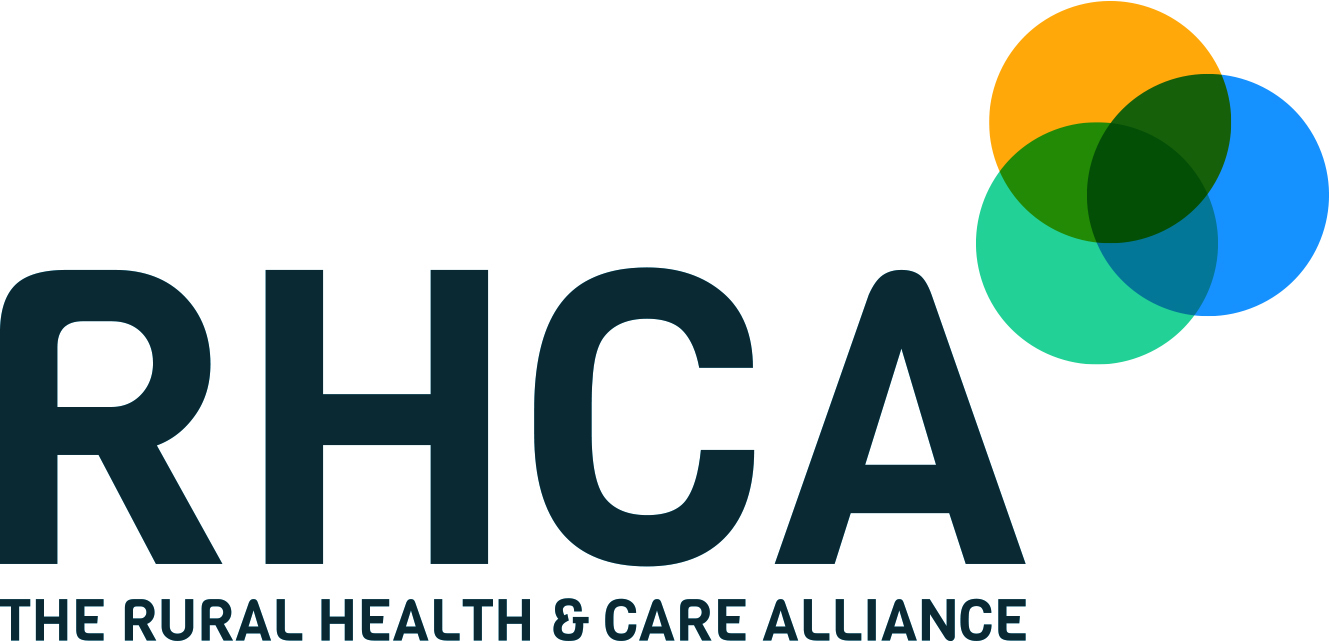 |
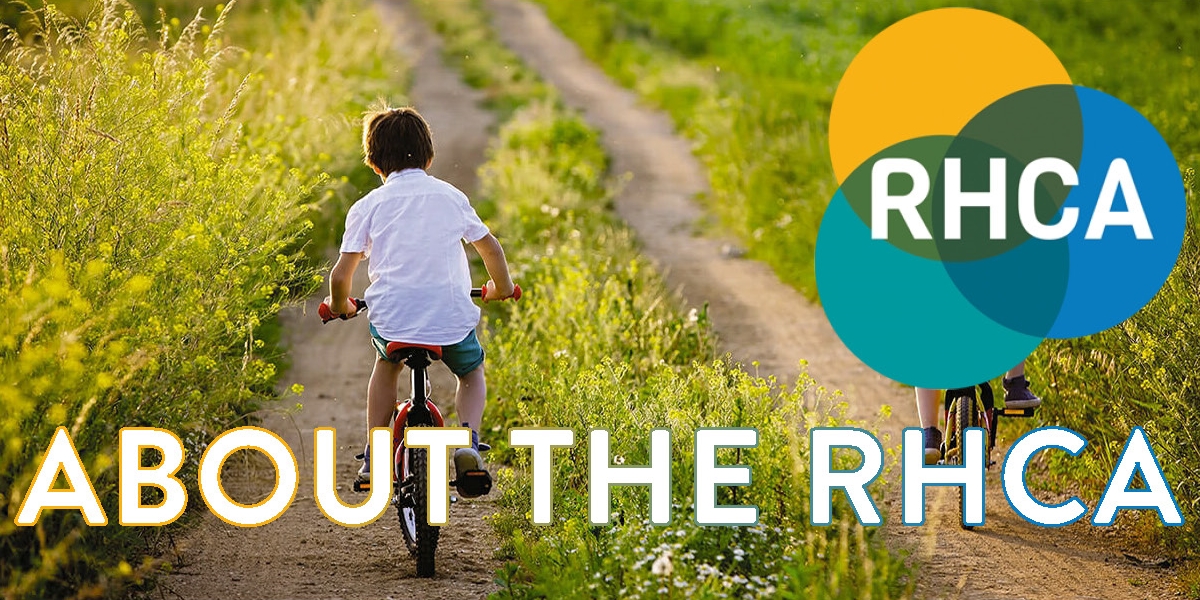 |
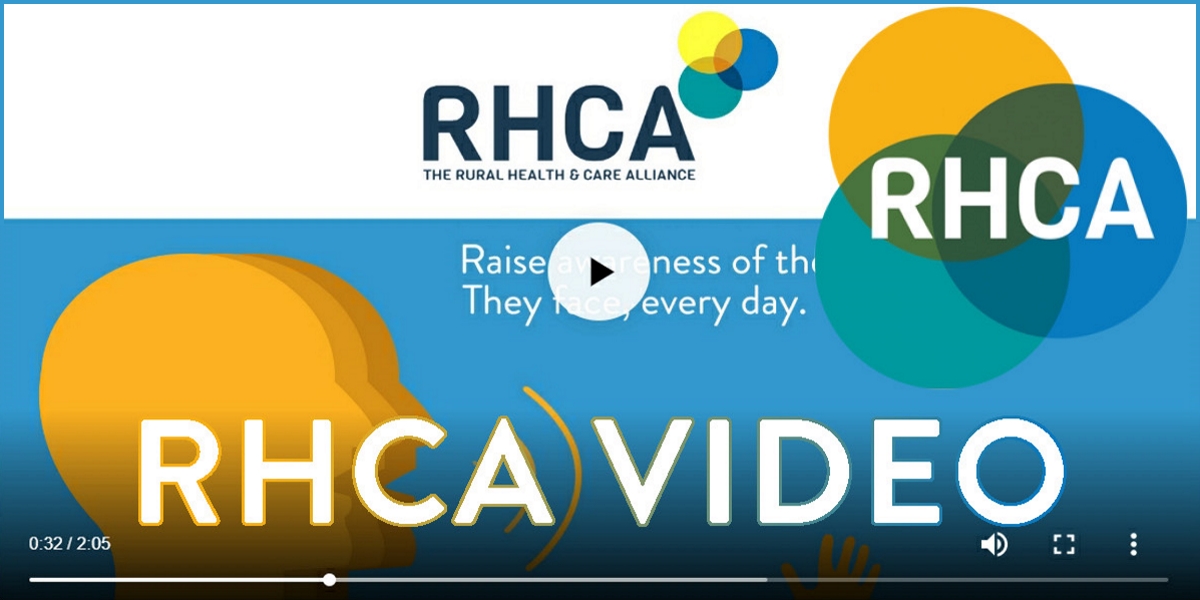 |
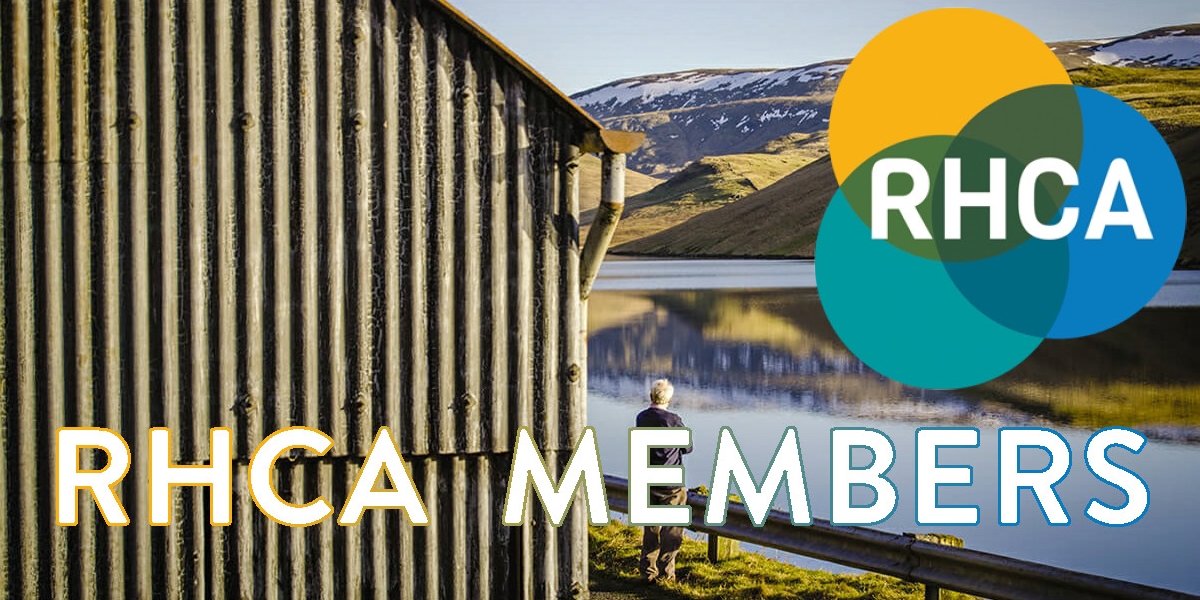 |
 |
 |
 |
 |
 |
 |


